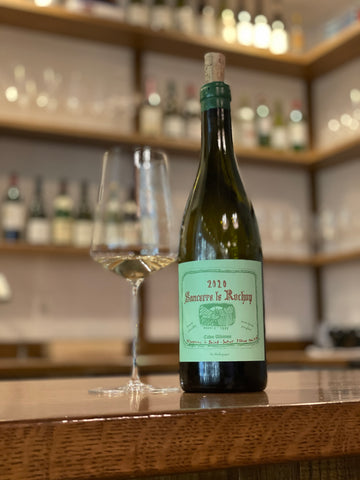A Quick Guide to Sauvignon Blanc

Some people say that Sauvignon Blanc matches any dish on which you’d squeeze a lemon. Others love it with cheeses or herbal, garlicky dishes. Another camp sips it as an apéro with salty snacks or on its own before dinner. This versatile white wine has emerged as a favorite, but it’s not all the same. Here’s a peek at some of the key Sauvignon Blanc regions around the world and what makes them worth exploring for your next dinner — and yes, it does belong on the Thanksgiving table.
Loire Valley
Sauvignon Blanc was born in Bordeaux, but the Loire Valley is the source for some of France’s most well-known versions of the variety. Because vintners here rarely blend Sauvignon Blanc, it shines as a standout in Sancerre, Pouilly-Fumé, Reuilly, Menetou-Salon, Quincy, and Touraine Blanc. Often crafted dry and refreshing, with acid-driven notes of citrus or grass, these are generally wines that can be enjoyed relatively young. Shrimp, lobster, veggies, and cheeses are some classic pairing favorites. Thanks to a generous level of acid, these wines can also show the ability to age, and one may find rich releases that have some oak treatment. Laporte Sancerre 'Vivienne’ — named after Dustin’s daughter — is a textbook example of one of the world’s most notable sites for Sauvignon Blanc, a crisp, dry, and citrus-driven bottle that will go nicely with a plate full of oven-roasted veggies and herbal turkey.
SHOP SANCERRE

New Zealand
In the Southwest Pacific, the island country of New Zealand is about the same size as the state of Oregon. In terms of the world’s wine production it’s only responsible for around 1% of output. Nevertheless, it doesn’t need volume to gain a worldwide reputation — it has a signature variety as a claim to fame. New Zealand is known as the Sauvignon Blanc capital of the world, thanks to the zingy and herbal wines that many people recognize as benchmarks of the variety. While there are seven wine producing areas on New Zealand’s two main islands, the bulk of Sauvignon Blanc is cultivated in the Marlborough region. The typical character of these wines is refreshing and highly aromatic, with grassy, citrus, or tropical notes. These wines are lovely with chicken marinated in herbs, tofu dishes, and roasted veggies.
Italy
In pockets scattered throughout Italy, you may hear Sauvignon Blanc referred to as simply, Sauvignon. In northern Italy, Friuli-Venezia Giulia and Trentino-Alto Adige regions are home to some of this country’s best examples of this variety. Swoop into Tuscany, and there are some excellent bottles there too. Ronco Del Gnemiz in Friuli-Venezia Giulia makes several of our favorites, with stone fruit and herbal notes plus a savory dimension that’s simply irresistible. Borgo del Tiglio, also in Friuli-Venezia Giulia, makes a full-bodied version that shows off more spice. We’d chill a bottle or two to pop before the big dinner hits the table — these are lovely with salty snacks — and the wine will transition to the meal if anyone has some left in their glass. Italian Sauvignon will pour nicely with the variety of the big feast.
California
In California, Sauvignon Blanc is the fourth most planted wine wine variety, and it is consistently gaining a foothold. Touted for being food-friendly, and a quenching opener, even wineries known for their red wines have begun to produce a release Sauvignon Blanc to charm their visitors. Up and down the California coast, one can find bottles to suit any taste, from lean and grassy to ripe and full bodied. Massican’s version from Napa Valley, for example, is both dry and intense, with a healthy shot of acidity. Meanwhile, Arnot-Roberts makes a release from Mendocino fruit that is more saline and herbaceous. Because these wines are bone dry and braced with acidity, but with enough fruit to show character they are suitable for mix-and-match family style meals.
SHOP CALIFORNIA SAUV BLANC

Argentina
Recent developments in Argentina have brought a white wine renaissance. Sauvignon Blanc has gained attention across the globe, in both old world and new world locales, and the growers of Argentina have made an investment in this variety. The vast terrain of this South American country offers many distinct terroirs and elevations in which sensitive Sauvignon Blanc can express itself. Mendoza’s Zorzal winery, for example, is the highest elevated estate in the region, with some vineyard sites climbing to 4,500 feet above sea level. They make only a few hundred cases of their crisp and bright version, a food-friendly partner for savory, herbal dishes and creamy cheeses.
A word on serving Sauvignon Blanc. Like other white wines, you’ll want to chill it down before you pop the cork. Place it in the fridge for a couple of hours, until the wine temperature is about 50–55°F. You could also pop it in an ice bucket for around 30 minutes. Take some test runs in the kitchen and you’ll find your own pairing favorites — no doubt Sauvignon Blanc will become a mainstay.
